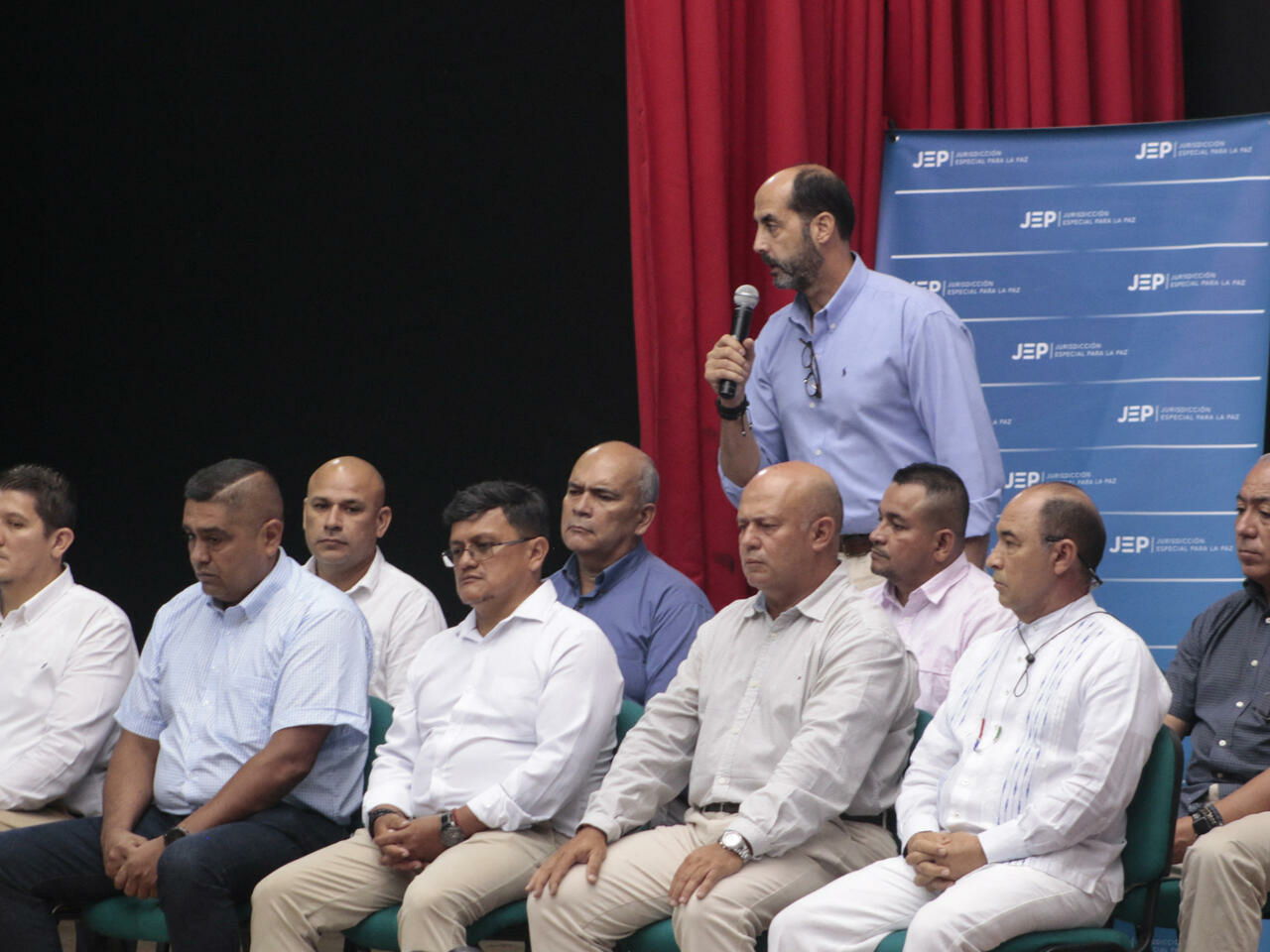RIO DE JANEIRO, BRAZIL – In the same Colombian town where they committed their crimes in the 2000s, ten retired military officers began to acknowledge on Tuesday, before the victims’ families, the cold-blooded execution of 100 civilians they presented as guerrillas killed in combat.
In the unprecedented two-day hearing, organized by the Special Jurisdiction for Peace (JEP) in Ocaña, in the department of Norte de Santander, bordering Venezuela, the soldiers confessed in public their responsibility for the disappearance and subsequent murder of 120 young people, mostly poor.
Some 50 relatives of the victims lined up at a university theater in this town, displaying photographs of their relatives.

On stage, they sat face to face in front of their victimizers and five magistrates of the tribunal that emerged from the historic 2016 peace agreement, which until April 27, heard the accounts of a general, four colonels, five officers, and a civilian who collaborated in the crimes.
“I ask them to clear the name of our relatives (…) they were working peasants, not as they branded them as subversives, guerrillas, thugs,” claimed Eduvina Becerra, partner of Jose Ortega, a farmer who lived some 300 kilometers from Ocaña before he was killed.
His lawyers, delegates from the UN and the OAS, and dozens of people were silent before the macabre story during the hearing.
Colonel Rubén Castro acknowledged the existence of a “criminal gang within” his men “created with the sole purpose of increasing” casualties “at any cost. The former commander of the XV Mobile Brigade asked for forgiveness for having demanded the assassination of “good people”.
Known as “false positives,” the murders of civilians presented as guerrillas killed in combat is the biggest scandal in the history of the Colombian Armed Forces.
Former military personnel and other victimizers of Colombia’s long-running conflict answer to the JEP for their crimes as part of the peace agreement that disarmed the Revolutionary Armed Forces of Colombia (FARC) in 2017. Those who confess to their crimes and make reparations to victims will receive alternative sentences instead of prison.
Amid tears from the victims’ relatives, the accused gave names and details about how they murdered their loved ones, most men between the ages of 25 and 35.
General Paulino Coronado, former commander of the 30th Brigade, which operates along the border, is the highest-ranking uniformed officer to appear at the historic two-day hearing.
During their ten-year tenure, the ten accused gave orders “without which the criminal conduct would not have occurred in a systematic and generalized manner,” said Judge Catalina Díaz in her intervention.
The JEP determined that Ocaña was the scene of a barbaric practice devised in a barracks located at the entrance to the town of some 100,000 inhabitants and motivated by an “institutional army policy of body counting” to inflate its achievements in the fight against the guerrillas and other armed groups.
“The army was deceiving us; they killed our comrades”, “brothers”, “sons”, alleged Sandra Barbosa, sister of Javier Peñuela, whom they tried to pass off as an ELN guerrilla.
The peace tribunal identified two modalities of “false positives”: One consisted of taking deceived young people to towns far from their homes and then killing them. In the second, the victims were peasants forcibly detained in Ocaña and other municipalities in the Catatumbo region, which boasts the world’s largest amount of drug crops.
According to the testimony of Ocaña residents known to AFP, the army constantly bragged about its supposed success, and the town’s morgue could not cope with the corpses.
In exchange for the murders, the military received awards, permits, decorations, and promotions, detailed Magistrate Diaz. According to the court, more than 6,400 civilians were executed between 2002 and 2008, of which 402 died in this border zone.
Colonel Castro acknowledged having transmitted to his subordinates the “policies” of “the different echelons of command,” pointing to the then commander of the army, General Mario Montoya, whose demand for casualties “was always repetitive. Montoya has also been subject to the JEP since 2018 without accepting responsibility.
The peace tribunal judges the worst crimes of the half-century conflict that left more than nine million victims among the dead, maimed, kidnapped, and disappeared.
The magistrates of the JEP will determine the sentences of the ex-military after analyzing their testimonies and contrasting them with their investigations.
The victims will have 15 days to comment on the current hearings, and then the sentences will be known, reported the Justice of Peace.
Most of the ‘false positives’ occurred during the presidency of Alvaro Uribe (2002-2010), who claims they were isolated acts.
In 2021, the JEP charged former top FARC commanders for the kidnapping of at least 21,000 people. The rebel leadership will also have to make a public acknowledgment.
With information from La Tercera

